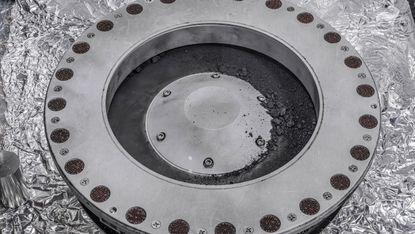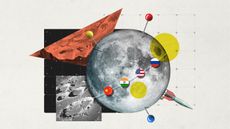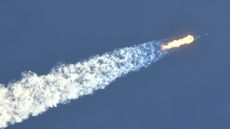Nasa reveals first findings from asteroid that could explain origins of life
Sample from Bennu has been found to contain an abundance of water and carbon

A sample from the near-Earth asteroid Bennu has been found to contain an abundance of water and carbon, reinforcing the theory that life on Earth was seeded from outer space.
Just two weeks after the sample was parachuted into the Utah desert, a small quantity of the material was unveiled by Nasa at the Johnson Space Center in Houston. "This is the biggest carbon-rich asteroid sample ever returned to Earth," Nasa administrator Bill Nelson said.
The asteroid material "included waterlogged clay minerals", said The New York Times. This "could help solve how Earth became a water planet" as asteroids similar to Bennu "may have crashed into Earth, filling our oceans". The sample also contained sulphur, a crucial element for many geological transformations in rocks.
Subscribe to The Week
Escape your echo chamber. Get the facts behind the news, plus analysis from multiple perspectives.

Sign up for The Week's Free Newsletters
From our morning news briefing to a weekly Good News Newsletter, get the best of The Week delivered directly to your inbox.
From our morning news briefing to a weekly Good News Newsletter, get the best of The Week delivered directly to your inbox.
Like other asteroids, Bennu "is a relic of the early solar system", said Al Jazeera. Because its present-day chemistry and mineralogy are "virtually unchanged since its formation", it could prove central to studies of astrobiology.
Nasa's unmanned Osiris-Rex spacecraft launched from Florida in 2016 and reached Bennu just over two years later. It made a brief, five-second contact with the asteroid in October 2020, gathering the material, which it then sent back to Earth via its sample capsule.
Nasa will now distribute parts of the Bennu sample to researchers around the world, who will study it in great detail. Their work will determine, among other things, "the identity of the carbon compounds, which could shed light on how life got started here on Earth", said Space.com.
"The bounty of carbon-rich material and the abundant presence of water-bearing clay minerals are just the tip of the cosmic iceberg," said Dante Lauretta, the principal investigator of the mission at the University of Arizona.
"With each revelation from Bennu, we draw closer to unraveling the mysteries of our cosmic heritage."

Continue reading for free
We hope you're enjoying The Week's refreshingly open-minded journalism.
Subscribed to The Week? Register your account with the same email as your subscription.
Sign up to our 10 Things You Need to Know Today newsletter
A free daily digest of the biggest news stories of the day - and the best features from our website
Jamie Timson is the UK news editor, curating The Week UK's daily morning newsletter and setting the agenda for the day's news output. He was first a member of the team from 2015 to 2019, progressing from intern to senior staff writer, and then rejoined in September 2022. As a founding panellist on “The Week Unwrapped” podcast, he has discussed politics, foreign affairs and conspiracy theories, sometimes separately, sometimes all at once. In between working at The Week, Jamie was a senior press officer at the Department for Transport, with a penchant for crisis communications, working on Brexit, the response to Covid-19 and HS2, among others.
-
 Dr Bush wins mullet of the year contest
Dr Bush wins mullet of the year contestTall Tales And other stories from the stranger side of life
By Chas Newkey-Burden, The Week UK Published
-
 Crossword: December 4, 2023
Crossword: December 4, 2023The Week's daily crossword
By The Week Staff Published
-
 Sudoku hard: December 4, 2023
Sudoku hard: December 4, 2023The Week's daily hard sudoku puzzle
By The Week Staff Published
-
 Cellphone use may be lowering sperm count
Cellphone use may be lowering sperm countSpeed Read Electromagnetic radiation could be affecting male fertility
By Devika Rao, The Week US Published
-
 NYPD to monitor Labor Day parties using surveillance drones
NYPD to monitor Labor Day parties using surveillance dronesSpeed Read
By Justin Klawans Published
-
 Dark side of the Moon: will the race to lunar South Pole spark conflict?
Dark side of the Moon: will the race to lunar South Pole spark conflict?Today's Big Question Russia and India are competing for the ‘new lunar gold’ – but real contest will be between the US and China
By The Week Staff Published
-
 How worried we should be about space debris
How worried we should be about space debrisfeature As part of a rocket washes up in Australia scientists warn ‘critical mass’ of orbital junk could only be decades away
By The Week Staff Published
-
 Elon Musk announces change to Twitter logo
Elon Musk announces change to Twitter logoSpeed Read
By Justin Klawans Published
-
 Twitter has reportedly threatened to sue Meta over Threads
Twitter has reportedly threatened to sue Meta over ThreadsSpeed Read
By Brigid Kennedy Published
-
 Judge limits how Biden officials can communicate with social media companies
Judge limits how Biden officials can communicate with social media companiesSpeed Read
By Catherine Garcia Published
-
 Meta to block news access for Facebook and Instagram users in Canada
Meta to block news access for Facebook and Instagram users in CanadaSpeed Read
By Theara Coleman Published










